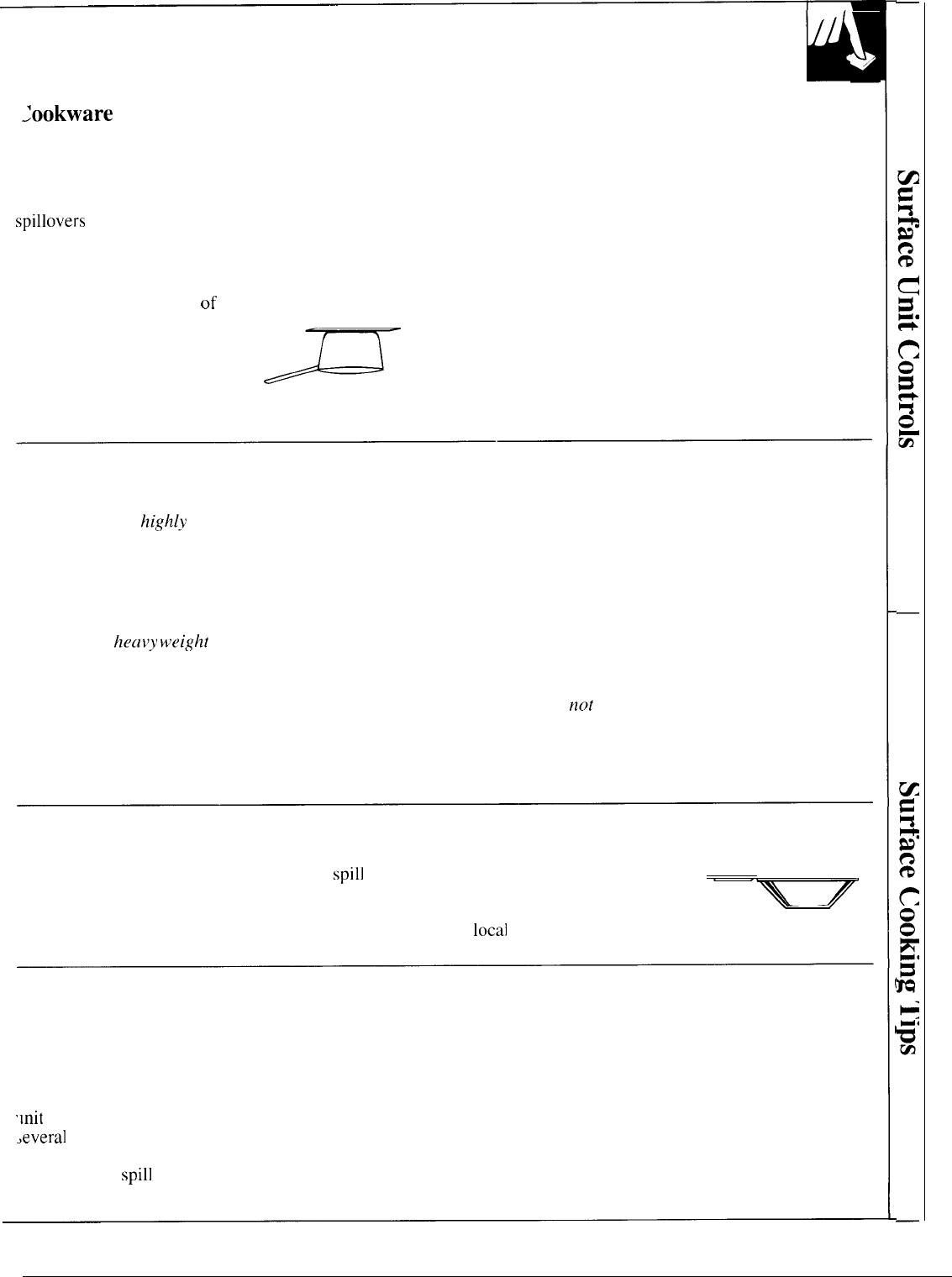
SURFACE COOKING TIPS
Jookware
Use of correct cookware can affect the cooking
performance and cleaning of your cooktop.
The
correct cookware reduces the temperature of the
glass ceramic surface and minimizes the chance of
spillovers
burning onto the surface units.
Use pans with thick, flat, smooth bottoms.
Slightly
concave pans give acceptable results. Do not expect
good results from convex bottom pans. To check the
flatness of your pan try 1
of the the following tests:
1.
Turn the bottom of the pan up.
Place the edge of a ruler across
the bottom of the pan. Little or
no light should be visible
under the ruler.
2.
Another simple test to determine even heat
distribution across the cookware bottom is to put
1 inch of water in the pan. Bring the water to a boil
and observe the location of bubbles as the water
starts to boil. Good flat cookware will have an even
distribution of bubbles over the bottom surface area
of the pan. Bubbles localized in only a portion of
the bottom indicate uneven contact of the pan to
the surface unit, uneven heat transfer or an
unsuitable pan.
Use pans that match the diameter of the surface
unit.
Cooking performance will not be as good if
the cookware is either smaller or larger than the
surface unit.
The following information will help you choose
cookware which will give good performance.
Stainless Steel: highly recommended
Especially good with a sandwich clad bottom. The
sandwich bottom combines the benefits of stainless
steel (appearance, durability, and stability) with the
advantages of aluminum or copper (heat conduction,
ven heat distribution).
Copper Bottom:
Good performance, but copper may leave residues
which can appear as scratches. The residues can be
removed, as long as the cooktop is cleaned immediately.
Porcelain/enamel:
Good performance only with a thick, flat, smooth
bottom. Avoid boiling dry, as porcelain can melt and
fuse to the surface.
Aluminum: heavy weight recommended
Glass-ceramic: not recommended
Good conductivity. Aluminum residues sometimes
Poor performance. May scratch surface. Usable, but
appear as scratches on the cooktop, but can be removed
not recommended.
if cleaned immediately. Because of its low melting
Stoneware:
not
recommended
point, thin weight aluminum should not be used.
Poor performance. Will scratch the surface.
Cast Iron: not recommended
Poor performance. Will scratch the surface.
Deep Fat Frying
Wok Cooking
Do not overfill cookware with fat that may
spill
over
We recommend that you use
—
when adding food. Frosty foods bubble vigorously.
only a flat-bottomed wok.
Watch food frying at high temperatures. Keep range
They are available at your
and hood clean from grease.
local
retail store.
Melted Materials on Cooktop
Melted materials
(plastic, aluminum foil, sugar or
Do not attempt further cleaning until the
foods with high sugar content)
can cause damage to
cooktop surface has cooled. See
the Care and
the cooktop.
Cleaning section.
If you accidentally melt anything on the cooktop, turn
mit
to LO, wipe the hot cooktop immediately with
.,everal
dry paper towels. Wearing an oven mitt, hold
the razor scraper at a 30° angle to the cooktop and
scrape the hot
spill
to a cool area outside of the
surface unit. Be careful not to burn yourself.
13


















